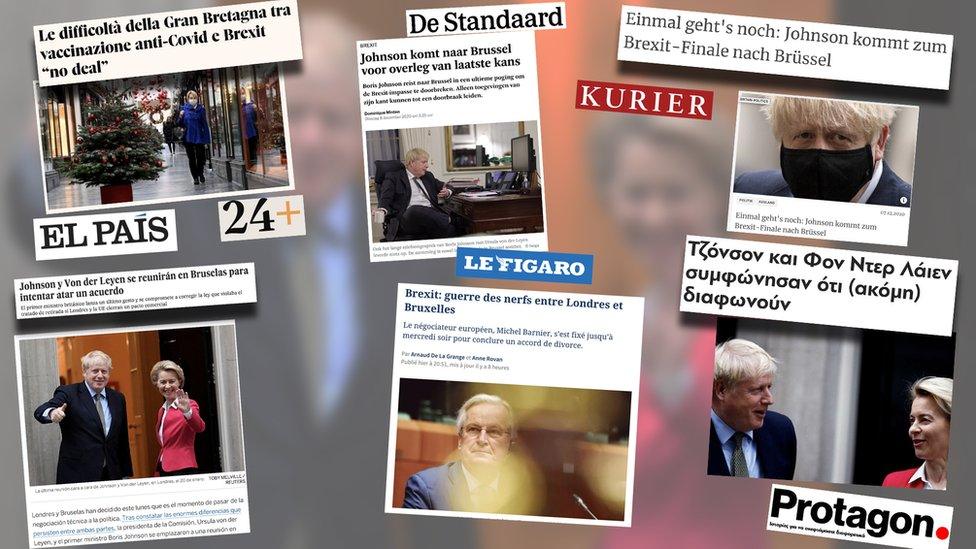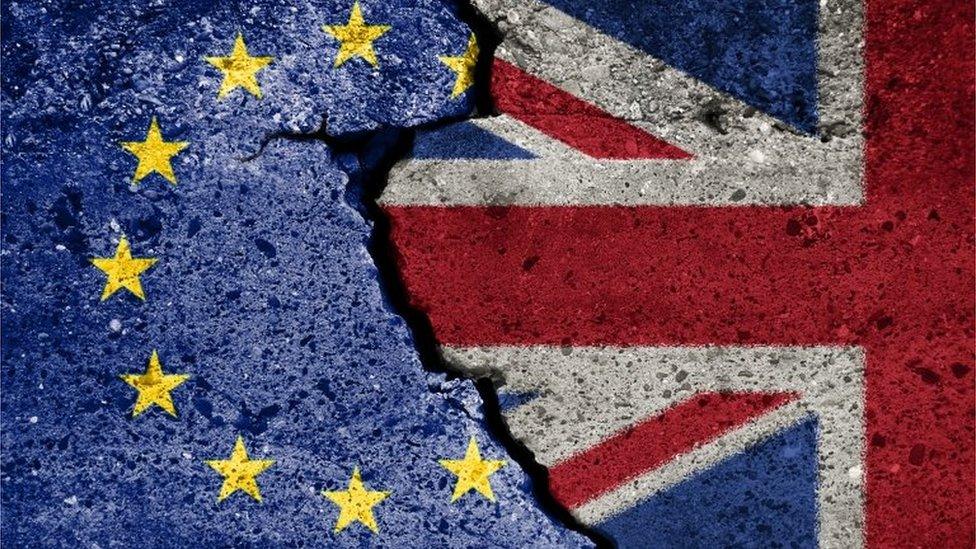Brexit: European press still asking 'deal or no deal?'
- Published

Newspapers across Europe seem unsure whether last-ditch talks between UK Prime Minister Boris Johnson and European Commission President Ursula von der Leyen in Brussels can salvage a post-Brexit trade deal.
While some - particularly in Germany - seem optimistic of a breakthrough, others come across as increasingly pessimistic, with one French daily observing "rarely has the fog been so thick".
"Deal or No Deal? Barely four weeks before the end of the Brexit transition phase, there is still no answer," says Germany's conservative Die Welt.
"Telephone diplomacy in the Brexit negotiations has reached its limits, and a top-level personal meeting should now bring about the breakthrough," says liberal economic daily Handelsblatt.
Commenting on "Brexit wrangling", popular tabloid Bild reports that "a personal meeting at the highest level should bring the breakthrough".
"Time pressure is enormous," notes centrist Frankfurter Allgemeine Zeitung. Centre-left Süddeutsche Zeitung agrees, saying "there is little time left" for the pair to "lead the Brexit talks to success".
According to France's centre-right daily Le Figaro: "One has to be very clever to say whether London and Brussels will reach an agreement on time. At this point, the two sides can only continue to note the extent of their differences."
Under the headline: "Brexit: uncertainty at its height", business daily Les Echos, external says "rarely has the fog been so thick", adding that "the tension now is not at its height but also presented as such".Italian financial daily Il Sole 24 Ore uses another topical analogy: "The vaccine that will be administered today in the UK offers the hope of halting the pandemic - but there's no antidote for Brexit," it said.
Corriere della Sera says "the growing feeling is that, no matter how difficult negotiations and compromises might be, a 'no deal' would be far more devastating". However, Boris Johnson's strategy is unclear, it believes: "Trump's exit has taken away a crucial political ally and the trade advantages he was hoping to obtain are now less likely."
Several Belgian media outlets have taken to explaining the details of a no-deal outcome to their readers.
Centre-right daily De Standaard says: "The negotiations, which have been ongoing for 10 months, are now really beginning to look like therapeutic stubbornness. They are continuing only because neither party is willing to be the first to pull the plug."An article in liberal daily Le Soir argues: "If there is no deal, there will be the return of customs duties and quotas... the bill promises to be expensive for an economy already hard-hit by the coronavirus."
The centre-left Spanish publication El País said London and Brussels had decided on Monday to move "from technical to political negotiation" after "four years of national trauma and confrontation".
El Mundo argues that Ursula von der Leyen faces "enormous pressure from Paris, Madrid or Copenhagen not to cross red lines", while Mr Johnson, who the publication considers to not have "very promising leadership experience", "believes he has a lot to gain and not so much to lose".
Dutch media remain cautious about prospects of a post-Brexit trade deal but see Mr Johnson's impending trip to Brussels as a sign of hope. Centre-left daily De Volkskrant notes: "In-person meetings are essential to making politically sensitive compromises."

Brexit - The basics
Brexit happened but rules didn't change at once: The UK left the European Union on 31 January but leaders needed time to negotiate a deal for life afterwards - they got 11 months
Talks are on again: The UK and the EU have until 31 December to agree a trade deal as well as other things, such as fishing rights
If there is no deal: Border checks and taxes will be introduced for goods travelling between the UK and the EU. But deal or no deal, we will still see changes

Greek conservative daily Kathimerini observes: "A thin red line separates us from a chaotic Brexit, without any kind of commercial agreement. The only thing both sides agree upon is that if we don't reach a compromise this week a non-consensual divorce can no longer be avoided."
For influential Greek opinion portal Protagon, external it is now or never: "There is simply no more time - 31 December is here."
An opinion piece in The Irish Times, external suggests that the agenda for the summit of EU leaders later this week "presents a picture of an orderly world".
"Left off the agenda are the two elephants that will be clattering around outside the conference chamber: Brexit, and a confrontation with Poland and Hungary over the rule of law," it says.
If compromises are not found soon, the EU could soon be looking at a double "no deal" - with the British, and with the Poles and Hungarians, it adds.
"A double 'no deal' - in the midst of the coronavirus pandemic - would get the EU off to the worst possible start to 2021. But the consequences of two bad deals would last for decades."


Related topics
- Published7 December 2020
